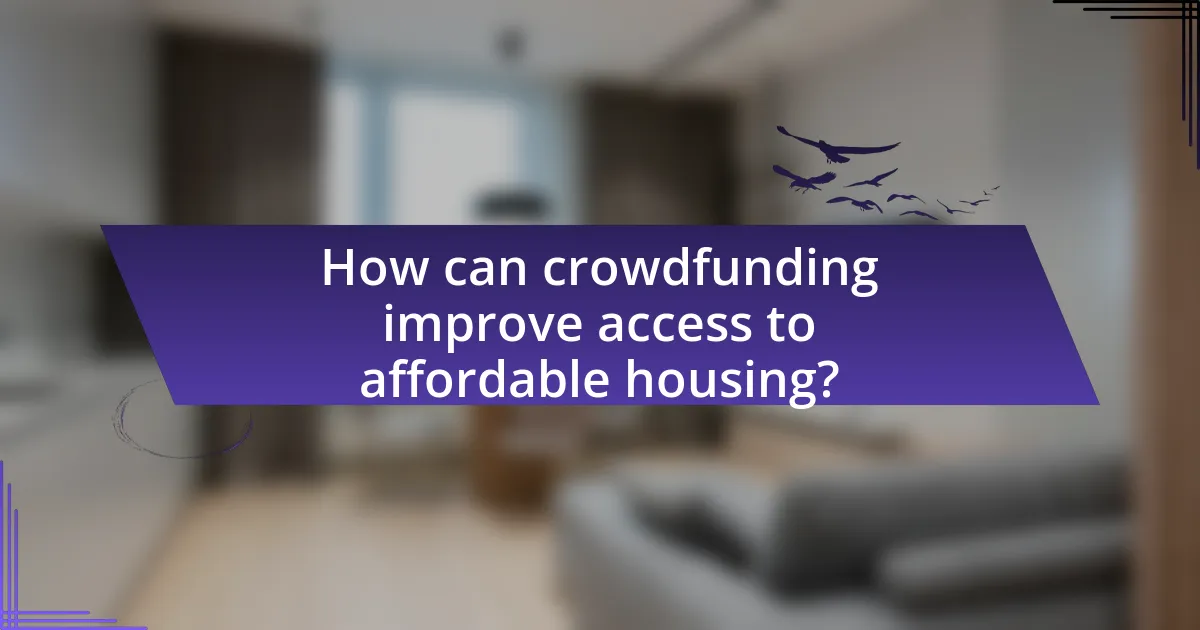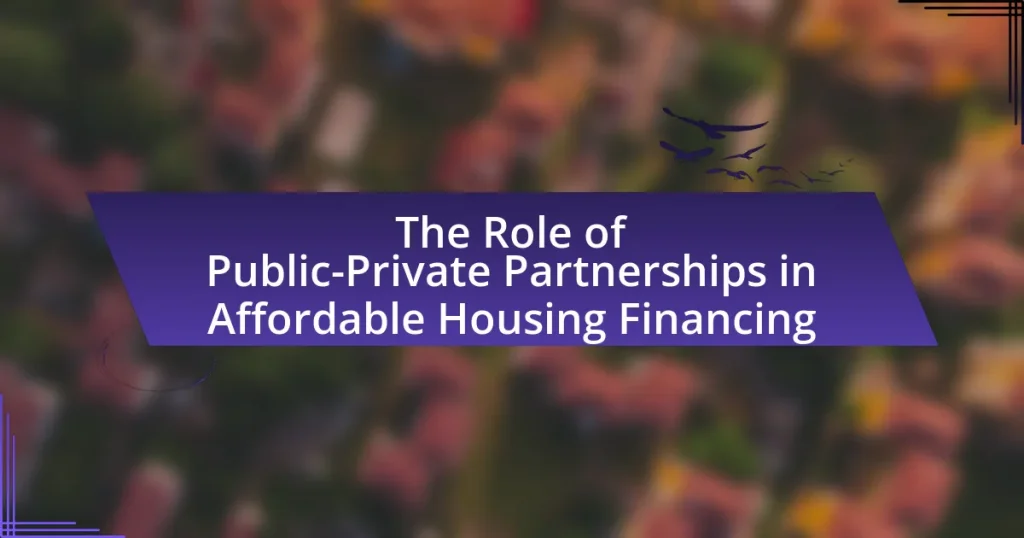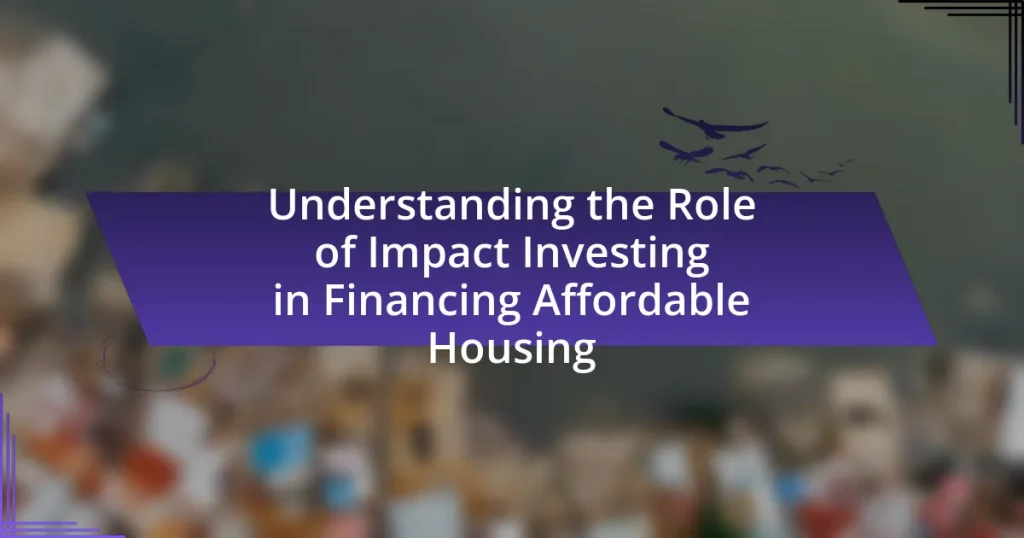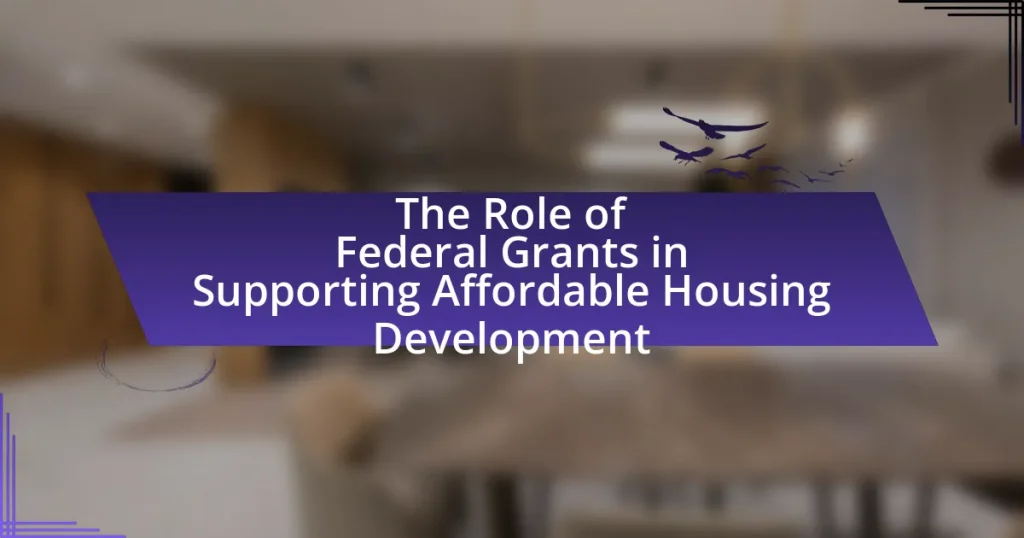The article focuses on the future of crowdfunding in affordable housing solutions, highlighting its potential to address funding gaps in housing development through innovative financing options. It discusses how crowdfunding platforms enable community involvement and democratize investment opportunities, with key players like Fundrise and RealtyMogul facilitating access to capital for affordable housing projects. The article also examines current trends shaping the sector, including regulatory support, technological advancements, and demographic shifts, while addressing challenges such as regulatory hurdles and investor skepticism. Additionally, it outlines best practices for successful crowdfunding campaigns, emphasizing the importance of community engagement, transparency, and effective marketing strategies.

What is the Future of Crowdfunding in Affordable Housing Solutions?
The future of crowdfunding in affordable housing solutions is promising, as it offers innovative financing options that can bridge the funding gap in housing development. Crowdfunding platforms enable individuals and organizations to pool resources, making it easier to finance projects that might otherwise struggle to secure traditional funding. According to a report by the Urban Land Institute, crowdfunding in real estate has grown significantly, with a projected market size of $300 billion by 2025, indicating a strong trend towards utilizing collective investment for housing initiatives. This shift not only democratizes investment opportunities but also fosters community involvement in housing projects, enhancing social equity and accessibility in affordable housing.
How is crowdfunding currently being utilized in affordable housing?
Crowdfunding is currently utilized in affordable housing by enabling individuals and organizations to pool financial resources to support housing projects that are often underfunded. This approach allows developers to raise capital directly from the community, bypassing traditional financing methods. For instance, platforms like Fundrise and RealtyMogul facilitate investments in real estate projects, including affordable housing, by allowing small investors to contribute to larger developments. According to a report by the Urban Institute, crowdfunding can help bridge the funding gap for affordable housing by attracting investments from a broader base of contributors, thus democratizing access to real estate investment opportunities.
What are the key platforms facilitating crowdfunding for housing?
Key platforms facilitating crowdfunding for housing include Fundrise, RealtyMogul, and Crowdstreet. Fundrise allows individual investors to participate in real estate projects with a minimum investment, democratizing access to real estate investment opportunities. RealtyMogul offers both equity and debt investments in commercial real estate, providing a diverse range of options for investors. Crowdstreet specializes in commercial real estate crowdfunding, connecting accredited investors with institutional-quality projects. These platforms have collectively raised millions in funding, demonstrating their effectiveness in mobilizing capital for housing initiatives.
How do these platforms operate within the affordable housing sector?
Crowdfunding platforms operate within the affordable housing sector by facilitating investments from multiple individuals to fund housing projects that are financially accessible. These platforms connect developers seeking capital with investors interested in supporting affordable housing initiatives, often allowing for smaller investment amounts that democratize access to real estate investment. For example, platforms like Fundrise and RealtyMogul enable users to invest in real estate projects, including affordable housing, by pooling funds to meet project financing needs. This model not only provides necessary funding for developers but also offers investors the opportunity to contribute to social impact while potentially earning returns, thereby addressing the critical shortage of affordable housing in many regions.
What trends are shaping the future of crowdfunding in affordable housing?
The future of crowdfunding in affordable housing is being shaped by several key trends, including increased regulatory support, the rise of technology platforms, and a growing focus on community engagement. Regulatory support is enhancing the legitimacy of crowdfunding, as governments are implementing frameworks that facilitate investment in affordable housing projects. Technology platforms are streamlining the crowdfunding process, allowing for easier access to funding and broader participation from investors. Additionally, there is a heightened emphasis on community engagement, where local stakeholders are increasingly involved in the decision-making process, ensuring that projects meet the specific needs of the community. These trends collectively indicate a more structured and participatory approach to crowdfunding in the affordable housing sector.
How is technology influencing crowdfunding methods for housing?
Technology is significantly influencing crowdfunding methods for housing by enhancing accessibility, transparency, and efficiency. Online platforms enable a broader range of investors to participate in housing projects, allowing developers to reach potential backers globally. For instance, platforms like Fundrise and RealtyMogul utilize technology to streamline the investment process, offering detailed project information and real-time updates, which fosters trust among investors. Additionally, blockchain technology is being integrated into crowdfunding, providing secure and transparent transactions, which further encourages participation. According to a report by the World Bank, the use of technology in crowdfunding can increase funding opportunities for affordable housing by up to 30%, demonstrating its impact on the sector.
What demographic shifts are impacting affordable housing crowdfunding?
Demographic shifts impacting affordable housing crowdfunding include the increasing urbanization of populations, the rise of millennials and Gen Z entering the housing market, and the growing diversity in household structures. Urbanization has led to higher demand for affordable housing in cities, where crowdfunding platforms can mobilize resources more effectively. Millennials and Gen Z, who prioritize affordability and sustainability, are more inclined to invest in crowdfunding initiatives that align with their values. Additionally, the diversification of household structures, including single-parent families and multi-generational households, creates varied housing needs that crowdfunding can address. These shifts indicate a significant transformation in the landscape of affordable housing funding, as evidenced by reports showing that urban areas are experiencing a 20% increase in housing demand, particularly among younger demographics.
What challenges does crowdfunding face in the affordable housing market?
Crowdfunding in the affordable housing market faces significant challenges, primarily regulatory hurdles and investor skepticism. Regulatory frameworks often limit the types of projects that can be funded through crowdfunding, creating barriers for developers seeking to utilize this financing method. For instance, the U.S. Securities and Exchange Commission has strict rules regarding equity crowdfunding, which can deter potential investors due to perceived risks and complexities. Additionally, investor skepticism arises from concerns about the viability and transparency of crowdfunding platforms, as many projects lack a proven track record. According to a report by the Urban Institute, only 20% of crowdfunding campaigns in real estate successfully reach their funding goals, highlighting the difficulties in attracting sufficient investment.
What regulatory hurdles exist for crowdfunding in housing?
Regulatory hurdles for crowdfunding in housing include compliance with securities laws, investor protection regulations, and local zoning laws. Crowdfunding platforms must adhere to the Securities and Exchange Commission (SEC) regulations, which classify many crowdfunding offerings as securities, requiring registration or exemption filings. Additionally, the Jumpstart Our Business Startups (JOBS) Act allows for equity crowdfunding but imposes limits on the amount individuals can invest based on their income and net worth, complicating access for smaller investors. Local zoning laws can also restrict the types of housing projects that can be funded through crowdfunding, impacting the feasibility of certain developments. These regulatory frameworks create barriers that can limit the growth and accessibility of crowdfunding in the housing sector.
How do economic factors affect crowdfunding success in this sector?
Economic factors significantly influence crowdfunding success in the affordable housing sector by affecting investor confidence and funding availability. For instance, during economic downturns, potential investors may have less disposable income, leading to reduced contributions to crowdfunding campaigns. Additionally, interest rates impact borrowing costs; lower rates can encourage investment in housing projects, while higher rates may deter it. A study by the Urban Institute found that economic stability and growth directly correlate with increased crowdfunding activity in real estate, highlighting that favorable economic conditions can enhance project visibility and attract more backers.

How can crowdfunding improve access to affordable housing?
Crowdfunding can improve access to affordable housing by enabling diverse funding sources for housing projects, thereby reducing reliance on traditional financing methods. This approach allows individuals and organizations to pool resources, making it possible to finance developments that might otherwise be unfeasible due to high costs or limited investment interest. For instance, platforms like Fundrise and RealtyMogul have successfully funded residential projects, demonstrating that crowdfunding can mobilize community support and investment for affordable housing initiatives. Additionally, a report by the Urban Land Institute indicates that crowdfunding can democratize investment opportunities, allowing smaller investors to participate in real estate markets, which can lead to increased funding for affordable housing solutions.
What advantages does crowdfunding offer to developers and investors?
Crowdfunding offers developers and investors several advantages, including access to capital, market validation, and community engagement. For developers, crowdfunding provides a means to raise funds without relying solely on traditional financing methods, which can be restrictive. This approach allows them to gather financial support from a diverse group of investors, thereby reducing individual risk. For investors, crowdfunding opens opportunities to invest in projects that may have previously been inaccessible, allowing for portfolio diversification and the potential for high returns. Additionally, successful crowdfunding campaigns can serve as a form of market validation, demonstrating demand for a project before it is fully developed. This validation can enhance investor confidence and attract further investment. Furthermore, crowdfunding fosters community engagement, as local investors often feel a personal connection to the projects they support, which can lead to increased project visibility and support.
How does crowdfunding democratize investment in affordable housing?
Crowdfunding democratizes investment in affordable housing by allowing a diverse range of investors, including individuals with limited capital, to participate in funding projects that were traditionally accessible only to wealthy investors or institutional entities. This model enables small contributions from many backers, which collectively can finance significant housing developments. For instance, platforms like Fundrise and RealtyMogul have successfully raised millions for affordable housing projects, showcasing how crowdfunding can mobilize community resources and support local initiatives. By lowering the financial barriers to entry, crowdfunding fosters inclusivity and broadens the pool of stakeholders invested in the success of affordable housing solutions.
What role does community engagement play in successful crowdfunding campaigns?
Community engagement is crucial for the success of crowdfunding campaigns, as it fosters trust, builds a supportive network, and enhances visibility. Engaged communities are more likely to contribute financially and promote the campaign through their networks, leading to increased funding. Research indicates that campaigns with strong community involvement can raise up to 50% more than those without, highlighting the direct correlation between engagement and financial success. Additionally, community feedback can refine project goals, ensuring alignment with the needs and desires of potential backers, further driving contributions.
What innovative models are emerging in crowdfunding for housing?
Innovative models emerging in crowdfunding for housing include equity crowdfunding, community land trusts, and tokenization of real estate assets. Equity crowdfunding allows multiple investors to fund a housing project in exchange for ownership stakes, democratizing access to real estate investments. Community land trusts enable communities to collectively own land and develop affordable housing, ensuring long-term affordability and community control. Tokenization leverages blockchain technology to create digital tokens representing shares in real estate, facilitating fractional ownership and liquidity. These models are gaining traction as they address funding gaps and promote inclusive housing solutions.
How are hybrid models combining crowdfunding with traditional financing?
Hybrid models are combining crowdfunding with traditional financing by leveraging the strengths of both funding sources to enhance capital accessibility for affordable housing projects. These models typically involve crowdfunding platforms that allow individual investors to contribute smaller amounts, which are then supplemented by larger investments from traditional financial institutions, such as banks or venture capitalists. This approach not only diversifies funding sources but also mitigates risks for traditional investors by demonstrating community interest and support through crowdfunding. For instance, a study by the Urban Institute highlights that projects utilizing hybrid financing can achieve up to 30% more funding than those relying solely on traditional methods, showcasing the effectiveness of this combined approach in addressing affordable housing challenges.
What examples exist of successful crowdfunding initiatives in affordable housing?
Successful crowdfunding initiatives in affordable housing include the “Community Land Trust” model, which has been effectively utilized in various cities like Burlington, Vermont, where residents collectively fund and manage land for affordable housing. Another notable example is “Housing for Humanity,” which has leveraged crowdfunding platforms to raise funds for building homes for low-income families, successfully completing numerous projects across the United States. Additionally, “Fundrise” has enabled individual investors to contribute to real estate projects focused on affordable housing, demonstrating a scalable approach to community-driven funding. These initiatives have collectively raised millions of dollars, showcasing the potential of crowdfunding to address housing shortages and promote community involvement in affordable housing solutions.

What are the best practices for successful crowdfunding in affordable housing?
The best practices for successful crowdfunding in affordable housing include building a strong community engagement strategy, clearly defining the project goals, and ensuring transparency in financial reporting. Engaging the community fosters trust and encourages participation, as seen in successful campaigns like the “Community Land Trust” model, which emphasizes local involvement. Clearly defined project goals help potential investors understand the impact of their contributions, while transparency in financial reporting reassures backers about the responsible use of funds. According to a study by the Urban Institute, projects that maintain open communication and provide regular updates see a 30% higher funding success rate.
How can project creators effectively market their crowdfunding campaigns?
Project creators can effectively market their crowdfunding campaigns by leveraging social media platforms, engaging with their target audience, and utilizing storytelling techniques. Social media allows creators to reach a broad audience quickly; for instance, campaigns that actively engage users on platforms like Facebook and Instagram can see up to 50% more funding than those that do not. Engaging with the audience through updates, comments, and direct messages fosters a sense of community and trust, which is crucial for encouraging contributions. Additionally, employing storytelling techniques to convey the project’s mission and impact can resonate emotionally with potential backers, leading to increased support. Research indicates that campaigns with compelling narratives raise 20% more funds than those without.
What strategies enhance trust and transparency with potential investors?
Establishing clear communication enhances trust and transparency with potential investors. Regular updates on project progress, financial performance, and any challenges faced fosters an environment of openness. Additionally, providing detailed financial reports and forecasts allows investors to understand the investment landscape better. A study by the CFA Institute found that transparency in financial reporting significantly increases investor confidence, with 75% of investors indicating they prefer companies that provide clear and comprehensive information. Furthermore, engaging investors through Q&A sessions and feedback mechanisms can strengthen relationships, as it shows that their opinions are valued and considered in decision-making processes.
How can social media be leveraged to boost crowdfunding efforts?
Social media can be leveraged to boost crowdfunding efforts by enhancing visibility and engagement with potential backers. Platforms like Facebook, Twitter, and Instagram allow project creators to share compelling narratives, visuals, and updates that resonate with their audience, fostering a sense of community and urgency. For instance, campaigns that utilize targeted ads on these platforms can reach specific demographics, increasing the likelihood of attracting interested contributors. According to a study by the University of California, Berkeley, campaigns that actively engage with their audience on social media raise 50% more funds than those that do not. This demonstrates that effective social media strategies can significantly amplify crowdfunding success.
What common pitfalls should be avoided in crowdfunding for housing?
Common pitfalls to avoid in crowdfunding for housing include inadequate market research, lack of a clear value proposition, and insufficient communication with backers. Inadequate market research can lead to unrealistic funding goals and misalignment with potential investors’ interests, as evidenced by studies showing that projects with thorough market analysis are 30% more likely to succeed. A lack of a clear value proposition can confuse potential backers, resulting in lower engagement and funding; projects that clearly articulate their benefits typically attract 50% more contributions. Lastly, insufficient communication with backers can erode trust and lead to project failure, as consistent updates and transparency have been shown to increase backer retention rates significantly.
What mistakes do project creators often make during campaigns?
Project creators often make the mistake of underestimating the importance of marketing during campaigns. Effective marketing is crucial for reaching potential backers and generating interest, yet many creators fail to allocate sufficient time and resources to promote their projects. According to a study by Kickstarter, projects that actively engage in marketing efforts, such as social media promotion and email outreach, are 50% more likely to reach their funding goals. Additionally, creators often neglect to clearly communicate their project’s value proposition, leading to confusion among potential supporters. This lack of clarity can result in lower engagement and funding levels.
How can mismanagement of funds impact crowdfunding success?
Mismanagement of funds can severely undermine crowdfunding success by eroding trust among backers and leading to project failures. When funds are not allocated properly, it can result in delays, subpar project execution, or even complete abandonment, which directly affects the project’s credibility. For instance, a study by the University of Cambridge found that 70% of crowdfunding campaigns that failed cited poor financial management as a key reason. This loss of trust can deter potential investors from supporting future campaigns, thereby diminishing the overall viability of crowdfunding as a financing method for affordable housing solutions.
What practical tips can enhance crowdfunding efforts in affordable housing?
To enhance crowdfunding efforts in affordable housing, it is essential to build a compelling narrative that resonates with potential backers. A strong story about the impact of the housing project can attract more supporters, as evidenced by successful campaigns that highlight community benefits and personal testimonials. Additionally, leveraging social media platforms for outreach can significantly increase visibility; campaigns that utilize targeted ads and engaging content have shown to raise funds more effectively. Furthermore, offering tangible incentives, such as equity stakes or rewards for contributions, can motivate donors to participate, as seen in various successful crowdfunding models. Lastly, establishing partnerships with local organizations can enhance credibility and broaden the donor base, as collaborations often lead to increased trust and support from the community.



